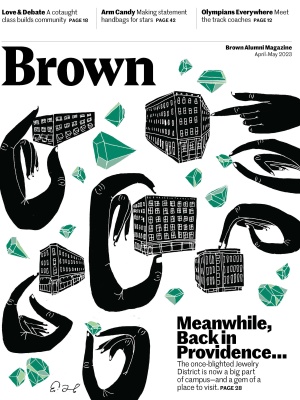Brown and Providence
Continuing to cultivate the relationship between the university and our local community.
Universities can and should enjoy strong, mutually beneficial relationships with the cities and states in which they are located. They can help grow local economies, extend their missions of education and research into their communities, improve the health of populations, and be active participants in civic life. Likewise, universities want the areas that they are located in to be vibrant and successful places for student, faculty, and staff to live, learn, and work.
But despite these mutual benefits, relationships between universities and local communities are often strained for any number of reasons. Cultivating these relationships isn’t easy. It requires consistent time, patience, and understanding that extends beyond individual relationships and transcends leadership changes. Without commitment to collaboration, the relationships between universities and their cities can become exclusively focused on financial contributions. But to limit these important relationships to financial transactions alone shifts attention away from the many things universities and their cities can do together, to everyone’s benefit.
Recognizing the importance of this work, we recently appointed Brown’s first-ever vice president for community engagement, Mary Jo Callan, who is also the Stark Family Executive Director of the Howard R. Swearer Center for Public Service. MJ, as she is known on campus, brings exactly the right sensibility to this work. She understands that community engagement initiatives work best when they are developed in collaboration with community stakeholders, reflect community needs and values, and are aligned with the University’s mission of education and research.
Fortunately, we are building from a strong base. Every day, the work of Brown’s faculty, staff, students, and alumni bring Brown’s commitment to the local community to life.
For instance, Brown’s School of Public Health (SPH) works with local stakeholders to address opioid use disorder and the overdose crisis. SPH is collaborating with state partners to develop neighborhood-based interventions in Providence and Rhode Island with the goal of reducing overdoses and deaths. Meanwhile, the Warren Alpert Medical School was the first in the nation to graduate a class with training allowing them to prescribe medications to treat opioid use disorder in any state across the country, including Rhode Island.
For decades, the University has worked closely with leaders in Providence to support K-12 education. Recently, Brown worked with Hope High School to create a newly refurbished and modernized library and media center, and with educators at Vartan Gregorian Elementary School to develop a “STEAM” room where students engage in hands-on learning. And, last spring, we welcomed 200 Providence high school students to College Day at Brown, where they had a chance to experience classes, learn about the college admissions process, and gain insight into what it’s like to be a college student that we hope will encourage them to pursue higher education at Brown and elsewhere.
In many cases, Brown student leaders are the ones to catalyze community partnerships. Since 2019, undergraduates at the Nelson Center for Entrepreneurship have mentored over 200 local high school students in the fundamentals of entrepreneurship, with the goal of inspiring them to become lifelong innovators and successful business owners.
I am also proud of Brown’s participation in Building Futures, a pre-apprenticeship program that prepares local residents for good jobs in the construction trades. We look forward to having many Building Futures apprentices involved in the construction of a new integrated life sciences building in Providence’s Jewelry District. With this project, Brown hopes to act as a catalyst for further development by attracting new business to the area, while also creating new jobs and generating discoveries that will benefit the health and well-being of people all over the world, including Rhode Island residents.
Advancing our work in community engagement will require dedication, diligence, and open communication between Brown and the local community. With sustainable and effective partnerships, our efforts will have a greater positive impact and be more responsive to the community. It won’t be easy. But if we get it right, it will be well worth the effort.
Read the April–May President's Spread on “Humanities Hub Prompts Critical Questions” here (PDF).




